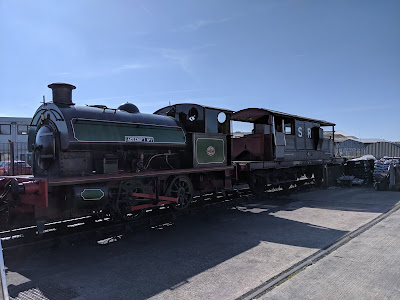In Part 3 of my series on my trip through the UK, we'll take a look at the National Railway Museum in York. The museum is right next to the mainline station, as it's the former site of a large depot and maintenance facility. My first port of call was the Great Hall, which used to be the motive power depot.
 |
| Trains around the turntable in the Great Hall |
The Great Hall includes a collection of trains from many eras, from the steam era right up to a 0 Series Shinkansen - a gift from the Kyoto Railway Museum in Japan - and a cross-section of the Channel Tunnel and one of the Eurostar trains than runs through it.
 |
| 0 Series Shinkansen and e300 Eurostar |
The Great Hall also houses an exhibit on hospital trains used during war time to transport passengers; a train that has been sliced open so you can see how the guts of a steam engine work; and a number of other displays like this.
 |
| LNER Class A4 4468 Mallard |
It also houses Mallard - the fastest steam train ever built, hitting its record-breaking speed of 203km/h in 1938, and an absolutely beautiful piece of machinery. It looks to be in quite good condition, but under the surface this may not be the case - apparently it almost never leaves the museum any more, and on the rare occasions it does run, it does so at very low speeds.
The National Railway Museum also owns Flying Scotsman, which was a previous recordholder as the fastest steam train - the first to top 160km/h - but it's much more actively run on the rail network, and unfortunately it wasn't on display while I was there. They do however capitalise a lot on their ownership of Flying Scotsman, because the giftshop is full of merch.
 |
| Flying Scotsman running on a tour in 2017 (source) |
Behind Mallard is what can only be described as a shed full of railway memorabilia - not what you'd perhaps expect from a formal museum, more what you'd expect in the shed of an enthusiast. My understanding is that this is effectively the "back room" of bits and pieces that aren't necessarily being used in formal displays, and that most museums would have rooms like this but NRM actually lets the public see them. Which is nice.
 |
| The workshop |
Attached to this shed is the workshop where they repair and rebuild the trains for display. You can sit there and watch them actually work on them, if you are so inclined.
Hanging off the edge of this building is a viewing area, where people can look out over the tracks and watch the trains heading in and out of York Station. It has a departure board tied into the real-time data from the station - prime gunzel territory.
 |
| Gorgeous vintage travel posters on the way into the Station Hall |
The other main part of the museum is the Station Hall. This houses a lot of trains and carriages, but also bits and pieces like historic travel posters, station nameboards, vintage ads, and so on. Which is all very nice. The very prominent exhibition when you first walk in is the Royal Trains - those used by members of the British Royal Family from Queen Victoria onwards. There's also a mixture of general steam trains, old freight carriages, and more modern passenger trains.
 |
| I'm a sucker for a nice heritage milk tanker - I'm pretty sure I had a toy one as a kid |
Out the back of the Station Hall, there's a bunch of more immersive activities, many of which aimed at kids - including a miniature railway, playgrounds and an actual full-sized steam train for rides. Unfortunately the steam train only generally runs on weekends, and I was there on a weekday, so I missed out on that.
 |
| Steam train rides unfortunately weren't running when I was there |
On the way out you can pass by the gift shop, which has a bunch of merch for the dedicated train nerd - everything from clothes to DVDs to posters to beer to...edible coal.
 |
| The perfect gift for the gunzel (or climate change denier) in your life |
After finishing at the museum, I spent a few hours exploring the rest of York - which has an incredibly rich history from the Romans through the Vikings and medieval castles - before heading off to Edinburgh. Part 4 here.

No comments:
Post a Comment